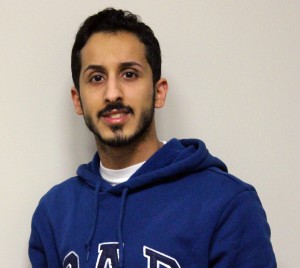Students deciding on their minor field of study will find wide-reaching merit in the Substance Abuse Treatment (SAT) minor offered by the University of Michigan-Flint’s Social Work Department.
The 15-credit, five-course minor is attracting a growing number of students from diverse academic disciplines who want to understand its application in their fields, including social work, criminal justice, psychology, business, education, and health care.
The SAT all-online minor prepares those who wish to obtain state certification as an addictions counselor. SAT classes as other program electives are available in-person.

Meteb Alghamdi, UM-Flint student majoring in health care administration, is one of several international students who chose to take an elective SAT course.
Taking the introductory SAT 202 course as an elective made sense for Meteb Alghamdi, a senior from Jeddah, Saudi Arabia, majoring in Health Care Administration. He received a government scholarship to pursue his bachelor’s degree at UM-Flint and hopes to work at a hospital or insurance company in Saudi Arabia after graduation.
“We don’t have a big problem with substance abuse back home but we do have treatment facilities,” he said. “We are Muslim and there are strong penalties for substance abuse. I wanted to find out more about the substance abuse problems here in the U.S. too.”
UM-Flint’s SAT course enrollment continues to build each year. In 2012-2013, 314 students enrolled, increasing to 368 in 2013-2014. Enrollment jumped to 594 students last year with Fall 2015 numbers continuing that trend.
The program also aims to address specific needs in the Flint community.
Otrude Moyo, Chair of the Social Work Department, cites more adolescents using substances in Genesee County, in addition to a growing concern with the use of prescription medications among the elderly population.
“The program addresses prevention as well as public health concerns about substance use,” said Professor Moyo. “It’s really geared toward practicing therapies.”
A lack of residential treatment facilities to meet the community’s needs is another concern that social work faculty say has contributed to greater interest in the SAT minor.
“In the Flint area, we have limited options for residential substance abuse programs,” explained Henry Tidwell, who teaches SAT courses at UM-Flint. Tidwell worked for 30 years as a substance abuse treatment therapist and was also a Flint police officer in the ‘70s and early ‘80s.
Tidwell noted that in Genesee County, only one out of 10 alcoholics who tries to quit is successful. For cocaine and heroin addicts, the success rate is even lower. Prescription drug use is also a problem.
He said having more locally-based residential treatment programs would boost treatment success rates for people trying to steer clear of substance abuse for good. Many with addiction problems are forced to attend rehab programs pursuant to court orders and other reasons but are unable to stay motivated to continue their treatment independently.
Ryan Ashley has 19 years of experience as a therapist and case manager with Community Mental Health in Lapeer and Oakland counties. He teaches SAT 202 at UM-Flint, providing an overview of various types of substances and why people turn to them.
“It’s not a class of scare tactics about drug use,” Ashley said. “The goal with the minor is to increase awareness of why people use drugs and to learn about safer alternatives.”
He has noticed that in the past five years, treatment programs have become more consumer-focused, a concept embraced by this minor. “We’re trying to get an idea of what people want out of treatment as opposed to us as therapists dictating their treatment,” he said.
